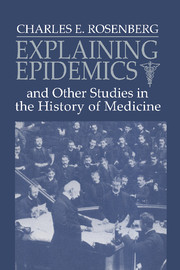Book contents
- Frontmatter
- Contents
- Acknowledgments
- Introduction: Why care about the history of medicine?
- I Ideas as actors
- II Institutions and medical care
- III The past in the present: Using medical history
- 11 The crisis in psychiatric legitimacy: Reflections on psychiatry, medicine, and public policy
- 12 Disease and social order in America: Perceptions and expectations
- 13 What is an epidemic? AIDS in historical perspective
- 14 Explaining epidemics
- 15 Framing disease: Illness, society, and history
- 16 Looking backward, thinking forward: The roots of hospital crisis
- Index
11 - The crisis in psychiatric legitimacy: Reflections on psychiatry, medicine, and public policy
Published online by Cambridge University Press: 29 March 2010
- Frontmatter
- Contents
- Acknowledgments
- Introduction: Why care about the history of medicine?
- I Ideas as actors
- II Institutions and medical care
- III The past in the present: Using medical history
- 11 The crisis in psychiatric legitimacy: Reflections on psychiatry, medicine, and public policy
- 12 Disease and social order in America: Perceptions and expectations
- 13 What is an epidemic? AIDS in historical perspective
- 14 Explaining epidemics
- 15 Framing disease: Illness, society, and history
- 16 Looking backward, thinking forward: The roots of hospital crisis
- Index
Summary
This essay was written for a meeting held in Williamsburg, Virginia, in 1973 to commemorate the bicentennial of the British North American colonies' first public hospital for the mentally ill. The celebration was invested with a certain irony, an irony that needs little explanation. The reputation of inpatient psychiatry was at a particularly low level in the early 1970s. The movement to deinstitutionalize men and women diagnosed as “mentally ill” had already begun, crystallizing generations of criticism. Clinical optimism, psychopharmacology, and a new kind of assertive liberalism had made the state hospital's custodial back wards seem an indefensible relic of a more primitive social order, and the population of America''s state hospitals had already begun to decline. This was a period marked by a more general skepticism toward the medical enterprise, and in particular toward psychiatric diagnoses and the medical authority that legitimated and enforced them. To a generation wary of credentialed authority, the gap between the labeling of deviance and the diagnosis of illness had begun to narrow; the diagnosed had thus become more victim than patient, more stigmatized than understood. Social control rather than humane care was psychiatry's perceived purpose; women, the poor, and the deviant generally were seen as its chosen targets.
- Type
- Chapter
- Information
- Explaining Epidemics , pp. 245 - 257Publisher: Cambridge University PressPrint publication year: 1992
- 2
- Cited by



